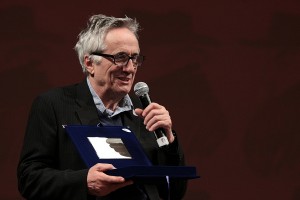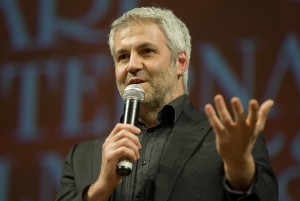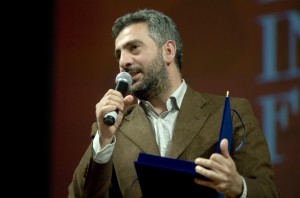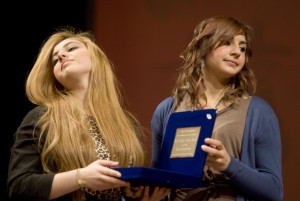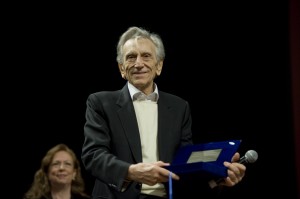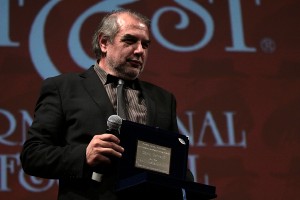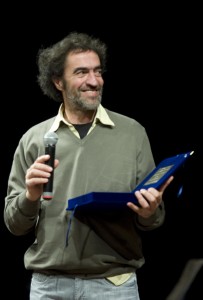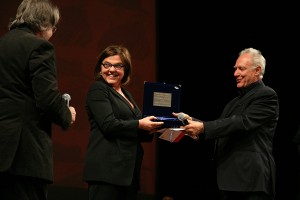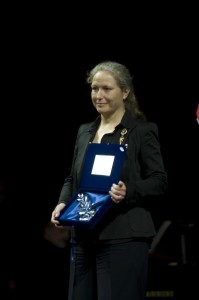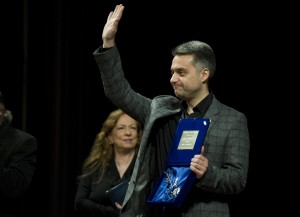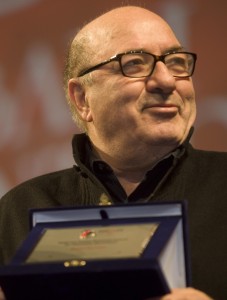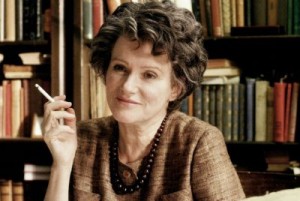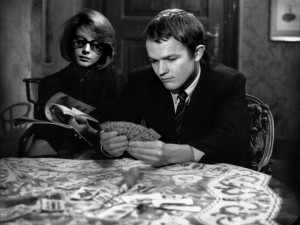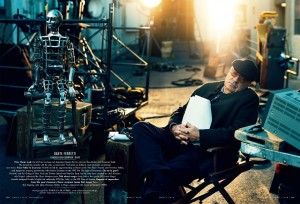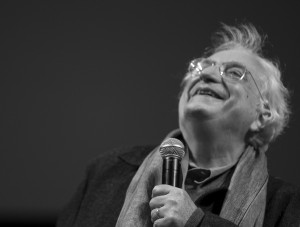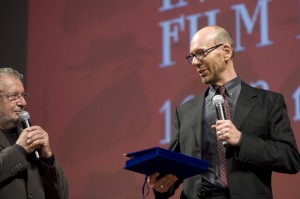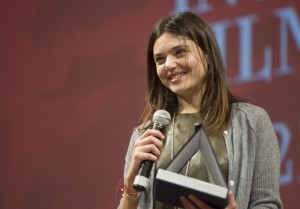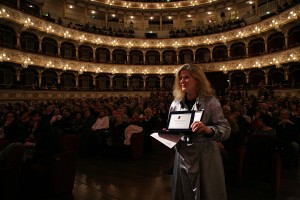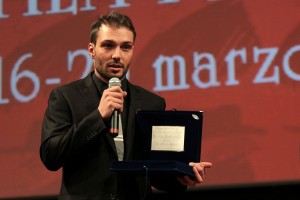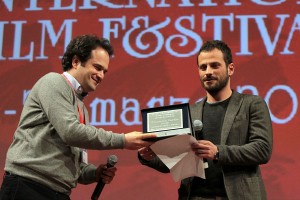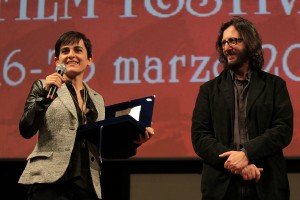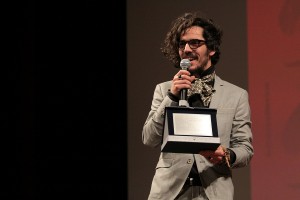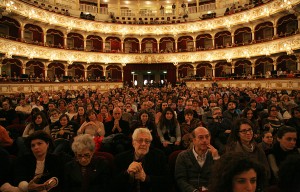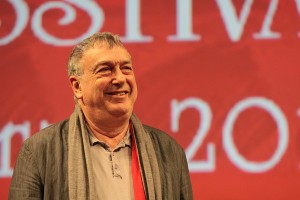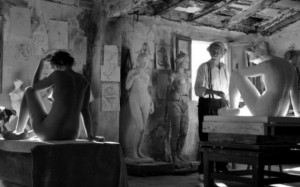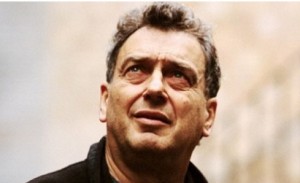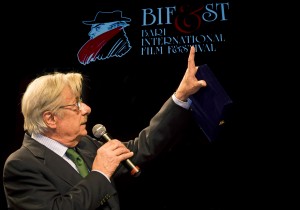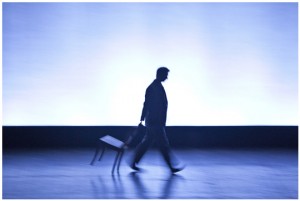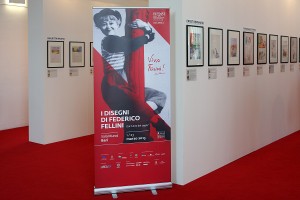2 marzo 2013
di Ettore Scola e Felice Laudadio
Nato appena tre anni fa e fortemente consolidatosi nelle tre precedenti edizioni – dopo l’esperienza pilota del 2009 accolta con entusiasmo dal pubblico e dal mondo del cinema – il Bif&st, il Bari International Film Festival, si presenta al quarto appuntamento con un ponderoso programma quanto a qualità dei film selezionati ma anche a quantità degli eventi e degli appuntamenti in programma, circa 400 in 8 giorni molto intensi. Si dirà, forse non a torto, che c’è “troppa roba”: è vero, ma è anche vero che il pubblico non solo barese, ma pugliese e spesso proveniente da altre regioni e altri Paesi, ha in passato più che premiato la già consistente offerta di film e di attività proposte dal festival. I 55.000 spettatori che lo scorso anno affollarono le 10 sale impegnate dal Bif&st si sentirono dei privilegiati rispetto ai tanti altri spettatori rimasti purtroppo fuori per esaurimento dei posti disponibili. Ecco dunque una delle ragioni dell’aumento dell’”offerta”, per così dire, nell’augurio di poter accontentare tutti.
by Ettore Scola and Felice Laudadio
Born just three years ago, Bif&st, Bari International Film Festival, strengthened its position in the last years after the “pilot” experience in 2009, which was enthusiastically received by the audience and the film industry. It now presents its fourth edition with a stronger program, both for the quality of the films and also for the number of events, about 400 in 8 very intense days. Someone may argue, perhaps rightly so, that there is “too much stuff”. It may be true, but it is also true that the audience coming not only from Bari, but also from all Apulia region, and often from other parts of Italy and foreign countries, has greatly responded to the extensive range of films and activities featured by the festival. Last year over 55,000 spectators crowded the 10 theaters used by the Bif&st and they felt privileged in comparison to the many other viewers unfortunately left outside because all the seats were sold out. This is one of the reasons for this year’s increase of what is being offered, in the hope that we will be able to accommodate everyone.
This however will not be easy because talents’ fame of almost all films programmed for World and International Premieres at the Teatro Petruzzelli will be very appealing to the audience. They range from the Italians:
Claudio Bisio, Beppe Fiorello, Sergio Rubini, Lillo, Neri Marcoré, Emilio Solfrizzi, Margherita Buy, Kasia Smutniak (Polish, of course, but now very much Italian) – who will be with us in Bari along with many others– to the “Americans”:
Al Pacino, Christopher Walken, Alan Arkin, Philip Seymour Hoffman, Jessica Chastain, Nicole Kidman, Matthew Goode, Ryan Gosling, Bradley Cooper, Eva Mendes, Ray Liotta – who instead will be with us only on the screen. This happens for a very simple reason: we have indeed in such a few years become one of the most important Italian festivals, but we are also very “poor” indeed if compared to events with very different resources. So even though we would love it, we cannot afford to celebrate, in Bari, the “star system” which receives so much attention from newspapers, televisions, radios and the internet. On the other hand we can count on, and we are honored by this, the participation of highly prestigious members of European cinema (and not only) such as, among others (and we apologize if we cannot mention everyone but space is running out): Stephen Frears, Bertrand Tavernier, Margarethe von Trotta, Barbara Sukowa, Abbas Kiarostami, Pam Katz, Jérôme Enrico, Daniel Hoesl, Jos Stelling, Valentí Figueres, Marco Bellocchio, Giuseppe Tornatore, Carlo and Luca Verdone, Adriano Celentano, Claudia Mori, Dante Ferretti, Francesca Lo Schiavo, Laura Morante, Giancarlo Giannini, Lina Sastri, Sergio Castellitto, Marco Tullio Giordana, Giuseppe Piccioni, Francesca Comencini, Riccardo Scamarcio, Gianni Quaranta, Giorgio Arlorio, Roberto Girometti, Pippo Mezzapesa, Daniele Vicari, Edoardo Winspeare, Lina Wertmuller, Daniele Ciprì, Riccardo Milani, Francesca Cima, Nicola Giuliano, Riccardo Tozzi, Domenico Procacci, Rolando Ravello, Alessandro Gassman, Jacopo Gassman, Luigi Lo Cascio, Paolo Sassanelli, Maurizio Millenotti, Gianfranco Plenizio, Alessio Boni, Marcello Prayer, Sergio Rubini, Fabrizio Gifuni, Roberto Herlitzka, Sergio Zavoli, Giuliano Montaldo etc. Some of them will hold the long-awaited and overcrowded “master classes”, which have characterized the cultural activities of the festival from the very beginning.
“Festival” is somehow a strongly reductive word in our case. What we really intended to build is a powerful cultural machine, or better still a formidable “culture celebration”, that resembles a matryoshka doll: one festival after another, in the same event. A“unicum” with a highly innovative and unprecedented formula, ranging from cinema to theater, music, literature, poetry, television, the treasures of the film archives, psychoanalysis, drawing, history, professional training workshops, confrontations and at times clashes, but always aiming at the discovery of new and unspoilt expressive and artistic languages.
This Festival edition could perhaps suggest – on a much larger scale than Apulia a single region very active in the cultural field – a proposal or a model in order to reaffirm the basic importance of culture as a means and an end for the convergence of interests and concerns of the civil society, nowadays in Italy so strongly and dangerously jagged. We aim to rich a strongly cultural and educational tone, that consists mainly of a peer to peer relationship, as a “right” to knowledge between already established filmmakers and intellectuals on one side and young people (especially, but not only) who thirst for films and for knowledge on the other side: which is in fact the same “side”.
To better understand this “thirst”, we must take into account the huge amount of requests we received from people who want to attend not only the master classes, but also the many professional training workshops and meetings, entrusted to famous filmmakers and actors in the role of teachers. Finally, and most importantly, the Bif&st is not limited to being just a showcase of finished products, but it works in depth in the search for documentary materials of some important figures of Italian cinema, this year in particular those regarding Federico Fellini, Alberto Sordi, Dante Ferretti and Francesca Lo Schiavo. Dozens and dozens of hours, over a hundred in the festival program, are in fact occupied by the screening of an impressive number of audio-visual materials on the art and philosophy of these formidable protagonists of the history of our cinema and our culture. Among them we have rightly included Armando Trovajoli, Mariangela Melato, Emidio Greco – whom we miss so much.
All this was made possible thanks to the confidence placed in us by valuable and prestigious structures such as Teche RAI and the archives of the Cineteca Nazionale, which have made available to us all the audio-visual materials, particularly the materials regarding Fellini and Sordi, and especially the “Story of an Italian” by Alberto Sordi, “Alberto the Great” as Carlo Verdone defines him, which seemed to be lost but has now finally emerged to light for the first time since the ‘70s and ‘80s.
To all those who have made this non-festival festival possible, starting from our excellent collaborators and ending with the Apulia Region, the Apulia Film Commission, the FIPRESCI and Arcipelago, which has found its home in Bari, a loving and deeply sincere “thank you”.
Read more →

